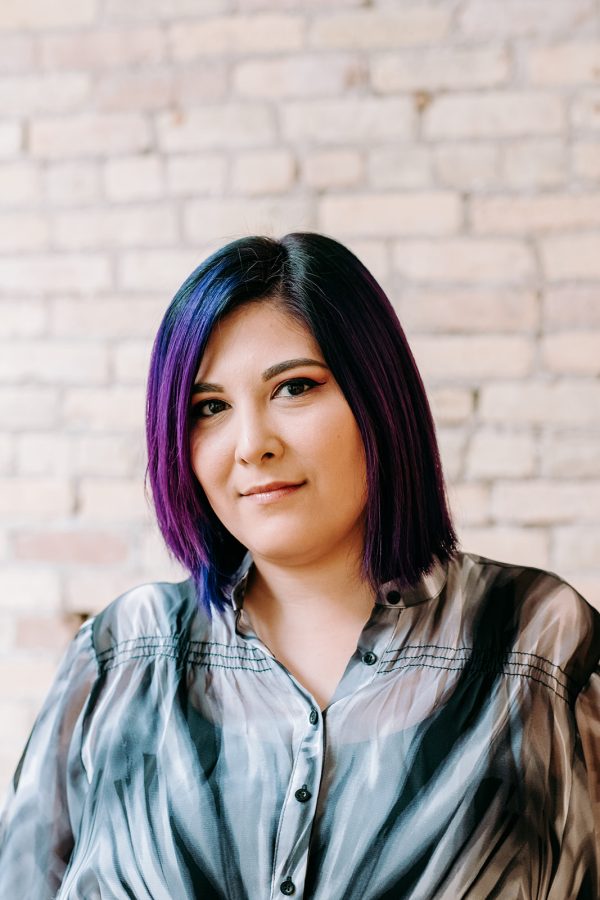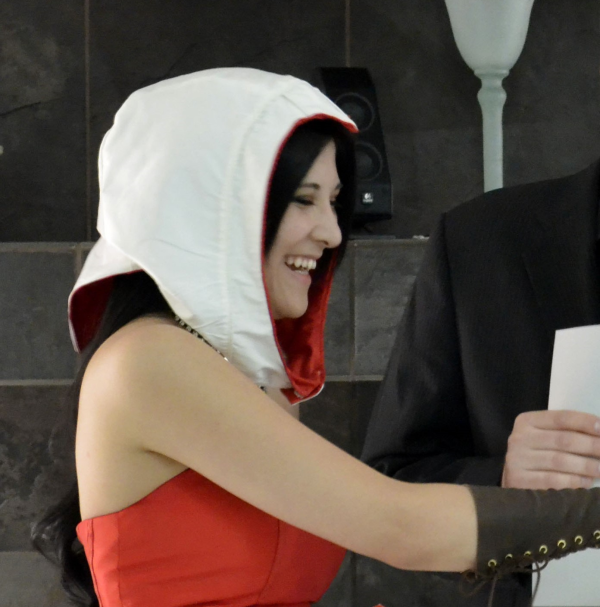 International Women’s Day is March 8 – a day to celebrate women’s achievements, raise awareness about discrimination, and take action to drive gender parity. This week, we’re putting a spotlight on just a few of the women inside Ubisoft Winnipeg and the work they do.
International Women’s Day is March 8 – a day to celebrate women’s achievements, raise awareness about discrimination, and take action to drive gender parity. This week, we’re putting a spotlight on just a few of the women inside Ubisoft Winnipeg and the work they do.
Jamie Kerr joined the Ubisoft Winnipeg studio as a production coordinator, and current works with two teams contributing to our game engines, Snowdrop and Anvil. She talked about what it takes to organize a team of developers, getting married in an Assassin’s cowl, and being your authentic self at work.
So can you tell me a little bit about a day in the life of a production coordinator?
Day-to-day, it’s both supporting our production managers, and supporting the teams of devs we’re responsible for. It’s a lot of task delegation, schedule monitoring, making sure that the resources are planned appropriately that people have what they need. Being a link between our dev teams and our tech leads and team leads and our production management team and other productions that we work with.
What kind of qualities do you think it takes to be a really great production coordinator?
Highly organized! Organization is always top of mind. Being prepared, and being able to flag for needs before people think that they need them, and helping manage an entire team’s schedule. Beyond that, being able to have a bit of a higher level perspective on things that are going on. Being that extra set of eyes, even if people are already aware of different issues or things that might be coming down the pipeline. There are a lot of things that need to happen to make sure that you are hitting all those sprint goals!
How did you pick up all those skills that you needed in order to really succeed at this job?
I’ve always worked in an organizational type of space in my career path – immediately prior to my time at Ubisoft, I was working as a production manager for a commercial video and animation studio. So with that came a lot of planning, a lot of scheduling. We had clients who had different goals and needs, and projects are all a little bit different, especially video productions vs animation productions, and we were working on up to 80 different projects at any given time.
Coming from that, it ended up being a very natural and easy transition for me to join Ubisoft. Now I get to focus on one or two projects that run for a longer period of time. And instead of external clients, I get to just work in a space where we’re dealing with our own interesting projects that we’re working on.
Speaking of transitioning industries, how did you make the jump into games?
Total fluke! Like a lot of people working in gaming in general, a lot of us come from nerdy backgrounds, I imagine – but it’s all different types of nerds! You could be a gaming nerd, or a finance nerd. But I always did have a passion for Ubisoft IP, playing the original Rayman on PlayStation is near and dear to my heart. And when my husband and I got married, we had an Assassin’s Creed themed wedding. My dress was inspired by Ezio and I had leather bracers on it.

Wait really?
Yeah! Instead of having a veil, I had a custom made Assassin’s Creed cowl hood with the pointed beak that matched my dress. Some people put their wedding dress into storage after. I totally deconstructed mine and reassembled it into a female Ezio-inspired cosplay. So yeah, needless to say, there is a fandom.
So how did you go from fan to a member of the team?
I used to be really concerned I would never be able to enter into tech, but more specifically to gaming. There was always that bit of stigma that there just isn’t a large base of women working in the tech industry. I’m also not very technically inclined, and the need always seemed to be for people who do programming and development and coding. So I always thought that that those things would be barriers for me to ever try to enter into gaming, and I started to set that idea aside.
But once I entered an industry that was more creatively driven, I realized that there was actually a lot more opportunity than I thought. There are people who work in the art space or creative writing space or production needs, and I was able to take my experience and knowledge in the production planning and management space and transmit those skills over. It was a perfect opportunity for me to translate my existing skill set specifically into a studio that I know I would be passionate working in.
How did it compare to your expectations when you joined?
Amazing. When the opportunity came up to join the Ubisoft studio in Winnipeg, it was very important for me to find somewhere that would be either a lateral or improved culture fit. And after doing my research and talking to a few people that I already knew who worked at the studio and getting their experiences, it really seemed like a really wonderful fit, even outside of the fact that I was already just a fan of Ubisoft properties and IPs. That was probably one of the most important factors that that reinforced my decision to apply – the fact that it I would be able to be completely and honestly and authentically myself.
What’s one thing you’ve learned about this industry after doing it that you wish you could tell everyone?
It is way more frank and honest than what people think it is! It is unlike any other industry that I’ve worked in. People are way more human with each other. Especially after having worked in industries where everything is hyper formal and you could never send an emoji to anyone.
